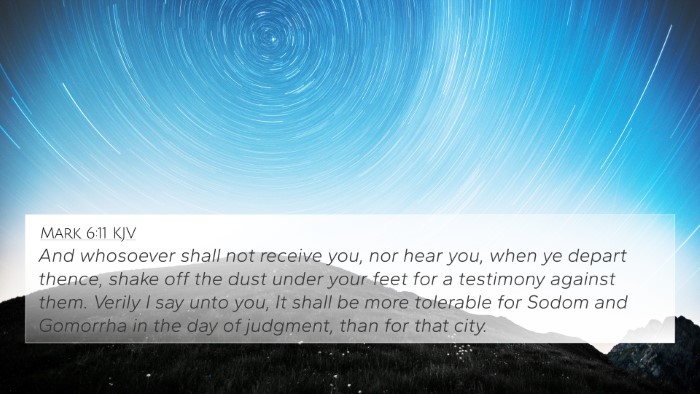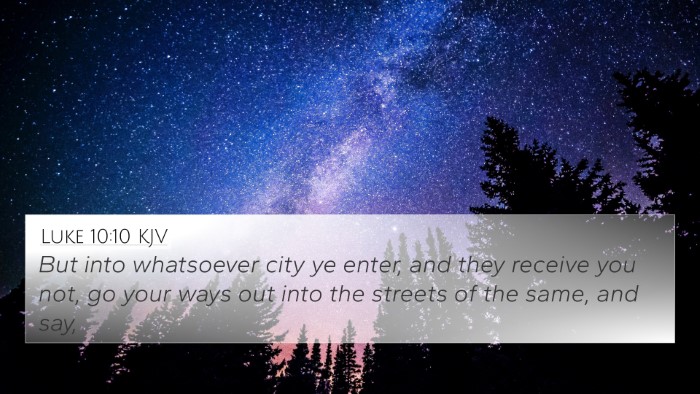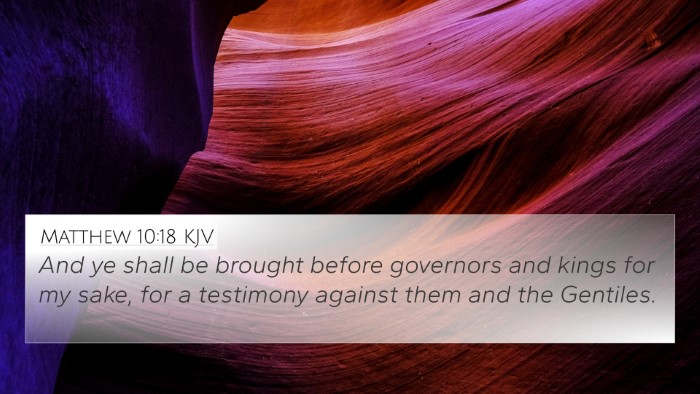Understanding Luke 9:5
Verse Reference: Luke 9:5
“And whosoever will not receive you, when you go out of that city, shake off the very dust from your feet for a testimony against them.”
Summary of Meaning
In Luke 9:5, Jesus instructs His followers on the rejection they may face during their ministry. This verse serves to empower the disciples, indicating that their mission may not always be received with open hearts. The act of shaking off the dust signifies a symbolic cleansing from the rejection, indicating that they should not carry the burden of others' disbelief. Through this action, they also serve as a testimony against the unresponsive towns.
Insights from Commentaries
Matthew Henry's Commentary
Matthew Henry emphasizes the importance of this directive as a measure of accountability. He notes that the dust represents the guilt that lies upon the unrepentant. By shaking off the dust, the disciples bear witness to the rejection of the Gospel, reinforcing the seriousness of their mission.
Albert Barnes' Commentary
Albert Barnes highlights that this act symbolizes the separation from those who reject the truth. He interprets the shaking off of dust as a sign of the disciple's commitment to spreading the Gospel without being hindered by those who oppose it. This, he argues, serves both as a warning and an illustration of the consequences of rejecting Christ and His messengers.
Adam Clarke's Commentary
Adam Clarke discusses the implications of this command in relation to the Jewish custom of shaking dust from their feet when leaving a Gentile territory. He interprets it as a powerful metaphor for the rejection of divine authority and a call for the disciples to move on from their unproductive ministry in order to focus on those who are receptive to the Gospel.
Cross Referencing Biblical Texts
Luke 9:5 connects with various other scripture passages, creating a web of thematic connections within the Bible. Here are some relevant cross-references:
- Matthew 10:14: “And whosoever shall not receive you, nor hear your words, when ye depart out of that house or city, shake off the dust of your feet.”
- Mark 6:11: “And whosoever shall not receive you, nor hear you, when ye depart thence, shake off the dust under your feet for a testimony against them.”
- Acts 13:51: “But they shook off the dust of their feet against them, and came unto Iconium.”
- Matthew 7:6: “Give not that which is holy unto the dogs, neither cast ye your pearls before swine.”
- Luke 10:10-11: “But into whatsoever city ye enter, and they receive you not, go your ways out into the streets of the same, and say, even the very dust of your city, which cleaveth on us, we do wipe off against you.”
- John 12:48: “He that rejecteth me, and receiveth not my words, hath one that judgeth him: the word that I have spoken, the same shall judge him in the last day.”
- Romans 1:16: “For I am not ashamed of the gospel of Christ: for it is the power of God unto salvation to every one that believeth.”
Thematic Connections
This verse provides a clear instruction on how to deal with rejection, revealing broader biblical themes of resilience in ministry. By understanding these connections, we can appreciate the continuity of scriptural teachings on evangelism, accountability, and the consequences of rejecting God's message.
Conclusion
Luke 9:5, as seen through various commentaries, underscores the importance of perseverance in the face of rejection. The act of shaking off dust not only symbolizes the disciples’ refusal to accept guilt for others' choices but also acts as a powerful testimony of the consequences for those who reject divine truth. This teaching resonates through numerous biblical verses, offering a richer understanding of our responsibility as bearers of the Gospel.
Tools for Further Study
For those looking to deepen their understanding of scripture and the connections between Bible verses, consider the following:
- Bible Concordance: A tool that helps identify where terms and themes appear across the Bible.
- Bible Cross-reference Guide: Resources that help map out related verses and themes.
- Cross-reference Bible Study: Methods for exploring and understanding connections in scripture.
- Comprehensive Bible Cross-reference Materials: Books and tools designed for deeper exploration of biblical texts in light of their thematic and narrative relationships.
Exploring Biblical Connections
Understanding Luke 9:5 within the context of cross-references not only provides clarity to the passage itself but also engages with the broader narrative of Scripture. The connections help unveil the rich tapestry of God’s word, encouraging deeper engagement with each verse. Whether seeking Bible verse interpretations or exploring thematic Bible verse connections, engaging with cross-references is invaluable for enhancing knowledge and faith.














